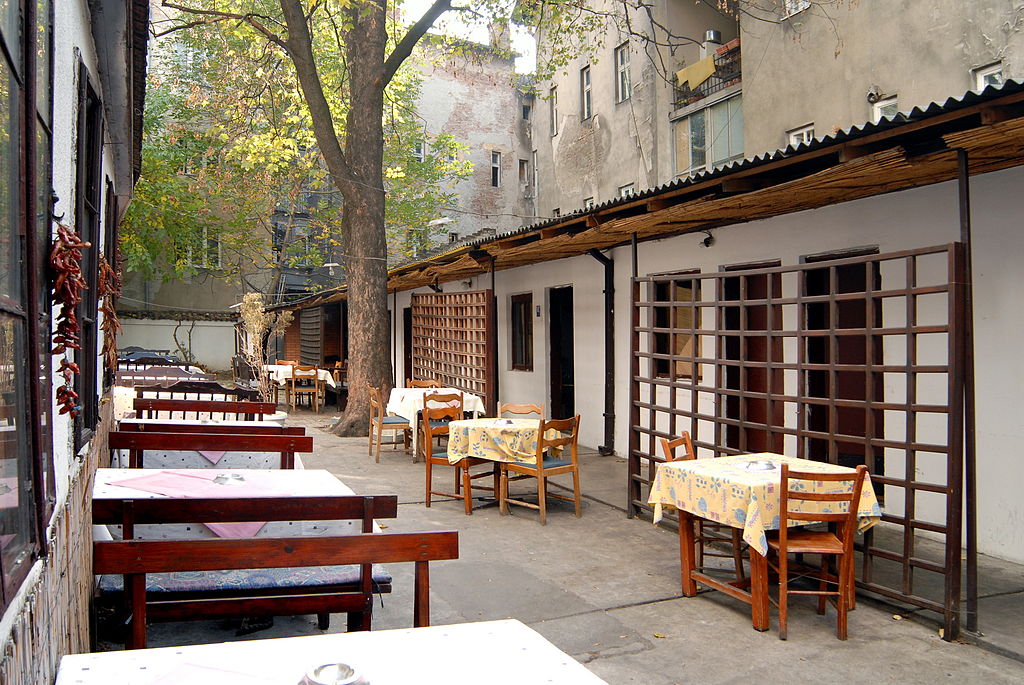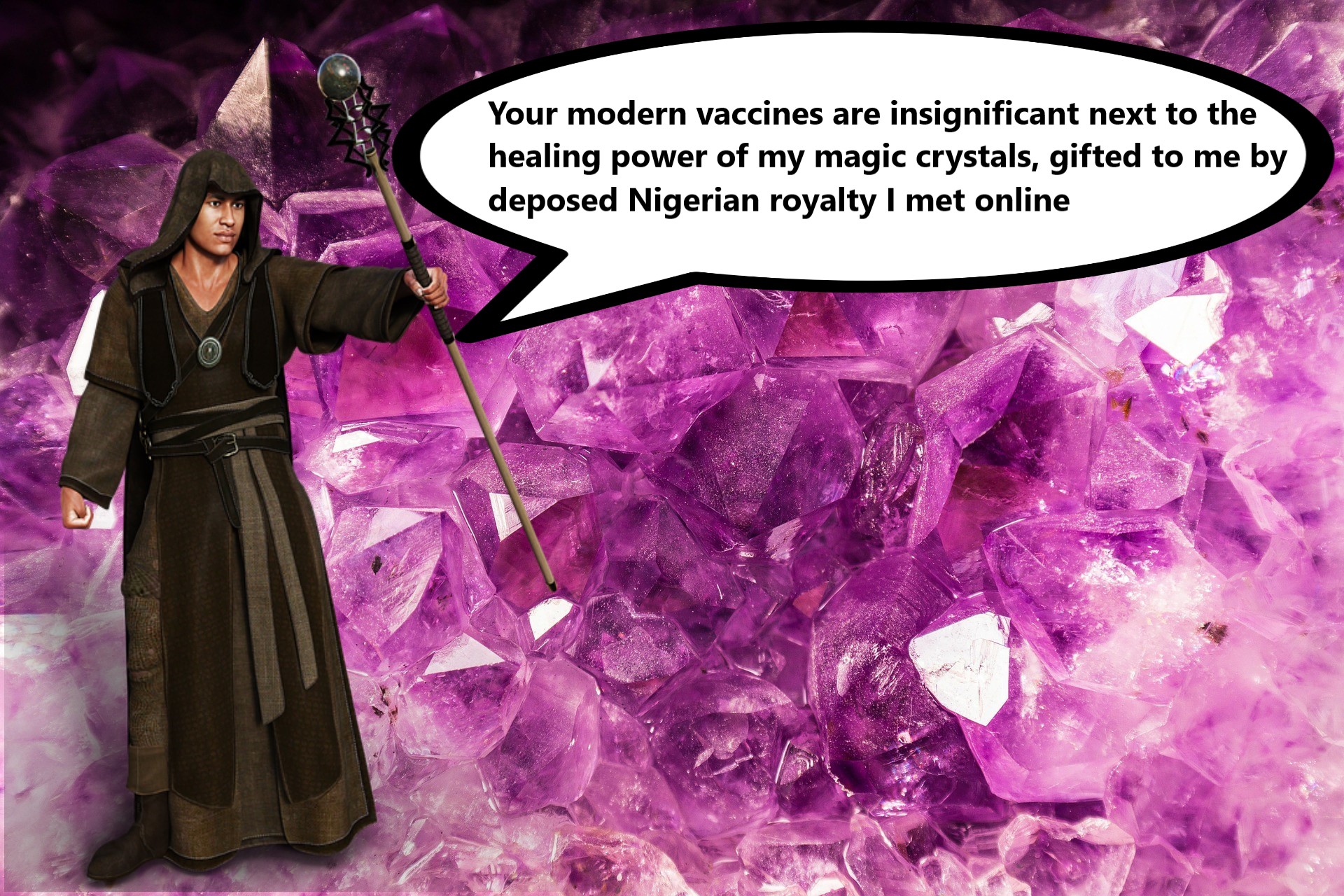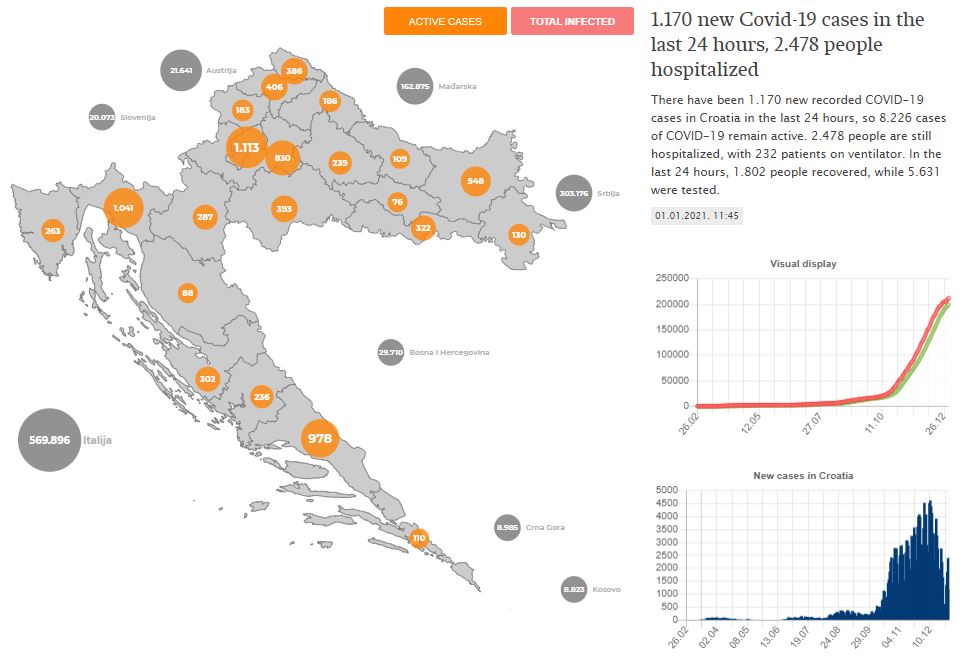Croatia Reports 1,170 New Coronavirus Cases, 41 deaths
ZAGREB, 1 January, 2021 - Croatia has registered 1,170 new coronavirus cases and 41 infection-related deaths in the last 24 hours, the national coronavirus response team said on Friday.
There were 8,226 active cases on Friday, of whom 2,478 people were receiving hospital treatment, including 232 who were on ventilators.
Currently 23,233 people are in self-isolation. Since February 25, when the first case of infection was confirmed in the country, a total of 1,024,740 people have been tested for coronavirus, including 5,631 in the last 24 hours.
Since the start of the epidemic 212,007 people have been infected with the novel virus, of whom 3,961 have died and 199,820 have recovered, including 1,802 in the last 24 hours.
For the latest travel info, bookmark our main travel info article, which is updated daily.
Read the Croatian Travel Update in your language - now available in 24 languages.
Join the Total Croatia Travel INFO Viber community.
Croats, Brits with Croatian Residence Can Return from UK to Croatia
January the 1st, 2021 - Following the shock ban on passenger transport from the UK to Croatia and vice versa after the discovery of a new strain of the novel coronavirus in parts of southern England, the ban has been lifted for Croatian citizens and British citizens who hold residence in Croatia. They may now travel home from the UK to Croatia.
The impulsive ban threw a proverbial spanner in the works for many a would-be Christmas traveller, and indeed for those waiting for turnaround flights by either British Airways or Croatia Airlines at either end. For some, the sheer level of wanton disregard for those trapped on either side of the channel was too much to deal with after a horrifically stressful year, with some taking their anger directly to PM Andrej Plenkovic's Twitter, where he announced what was to be an initial 48 hour flight ban.
It is worth remembering that the European Commission issued a non-binding recommendation that EU member states lift these blanket bans to allow for essential travel, as nobody should become stranded anywhere. Individual countries, however, could still do as they pleased, and Croatia did just that.
That initial 48 hour flight ban was extended until midnight on the 31st of January, 2020, as the rules for travel to the EEA for UK citizens who are also UK residents were set to change as Britain's transition period drew to a close anyway.
The official page of the British Government (GOV.UK) updated its rules as the UK's Brexit transition period ended last night, reflecting the changes. It now states that travel from the UK to Croatia, or indeed from UK citizens arriving from any other non-EU/EEA country to Croatia would not be permitted for the duration of Croatia's coronavirus measures, which are currently set to remain in place until the 15th of January unless they're extended again.
Thankfully, this ban on British travellers coming from either the UK or any other non EU/EEA country does not include Croatian citizens or British nationals who hold lawful residence in Croatia. Such people fall within the bracket of ''limited exceptions'' to this rule. As do those travelling for ''urgent personal, family or business reasons'', but all those arriving from the UK to Croatia for whatever reason must still present a negative PCR test result which is not older than 48 hours when crossing the Croatian border, or get tested immediately upon arrival (at their own expense) and self-isolate until a negative result is obtained.
It's worth remembering that testing isn't available at Croatian airports, so you're free to go and get your test from a testing centre (list here) before self-isolating. The results are typically available within 48 hours or less.
For the latest travel info, bookmark our main travel info article, which is updated daily.
Read the Croatian Travel Update in your language - now available in 24 languages
Croatia Confirms 2,391 New Coronavirus Case, 60 Deaths
ZAGREB, Dec 31, 2020 - Croatia has registered 2,391 new coronavirus cases and 60 infection-related deaths in the last 24 hours, the national coronavirus response team said on Thursday.
There were 8,899 active cases in Croatia on Thursday, of whom 2,524 people were receiving hospital treatment, including 231 who were placed on ventilators.
Since February 25, when the first case of infection was confirmed in the country, a total of 210,837 people have been infected with the novel virus, of whom 3,920 have died and 198,018 have recovered, including 1,733 in the last 24 hours. Currently, 22,010 people are in self-isolation.
A total of 1,019,109 people have been tested for coronavirus to date, including 8,441 in the last 24 hours.
Croatia Logs 1,850 New Cases of Coronavirus, 65 Fatalities
ZAGREB, Dec 30, 2020 - Croatia has registered 1,850 new cases of coronavirus in the past 24 hours and 65 people have died as a consequence, the national COVID-19 crisis management team reported on Wednesday.
There are currently 8,301 active cases and 2,608 are in hospital treatment and of that number 240 patients are on ventilators.
Today's numbers were registered after 6,322 people were tested in the past 24 hours. Since the outbreak of the epidemic a total of 1,010,668 tests have been conducted.
A total of 208,446 cases of the infection have been registered since the start of the epidemic, and of them 3,860 have died.
A total of 196,285 patients have recovered from COVID-19 so far, with 1,157 recovering in the past 24 hours while 23,094 people are still in self-isolation.
Croatia Registers 1,350 New Coronavirus Cases, 56 Deaths
ZAGREB, Dec 29, 2020 - Croatia on Tuesday registered 1,350 new cases of coronavirus and there are currently 7,673 active cases in the country while 56 people have died in the past 24 hours, the national COVID response team reported.
A total of 2,654 infected people are currently hospitalised and 254 of them on ventilators.
Since 25 February when the first case was registered in Croatia, a total of 206,596 people have been infected with the virus, of whom 3,795 have died and 195,128 have recovered, including 1,657 in the past 24 hours. Currently, 26,918 people are in self-isolation.
To date, a total of 1,004,346 COVID tests have been conducted, 7,411 of them in the past 24 hours.
What Kind of Life Awaits Croatian Anti-Vaxxers Who Refuse Vaccination?
December 29, 2020 – The arrival of COVID-19 vaccines in Croatia has been met with much relief by many people. But, not everyone is happy. Conspiracy theorists - those who favour disreputable sources and 'whispers on the wind' to real science - are reticent, some even angry. So, what kind of life awaits Croatian anti-vaxxers who refuse to take the vaccine?
The people who inhabit the lands now known as Croatia have a long history of being pushed around. For this, they cannot be blamed. Greatly outnumbered by the occupying armies of some of the most powerful empires of all time - the Romans, Venetians, Austro-Hungarians and Ottomans - their rebellions against such overlords have been relatively small in number. Their default setting has been to visit the kafana at the end of the day and moan, grumble, gossip - perhaps even plot - against those who make their lives disagreeable.
Croatia was finally freed of its last imposing masters over two decades ago. But, true to form, the grumbling in the kafanas has continued. Except, now that the kafanas are all closed in response to Coronavirus, the moaning has moved almost exclusively to the internet. And, it has reached a shrieking pitch.
The arrival of COVID-19 vaccines in Croatia has been met with much relief by many Croatians. The news of the first vaccinated citizen, followed by the first vaccinated healthcare workers, was also well received. You can tell this from the overwhelmingly large amount of 'likes' such news generates when posted to social media. These warm welcomers of good news in Croatia could be best described as the silent majority. And, in the same way most Croatians lay subdued for lifetimes under bullying empires, this silent, sensible majority is drowned out by the deafening vitriol of the unhinged within the comments sections underneath.
These arch-moaners appear in the comments on most issues, railing against the increasingly modern ways of the world. On the issue of Coronavirus and the incoming vaccines, it is the Croatian anti-vaxxers who are angrily dominating the discourse.
It appears near pointless to debate with them. They are not ones for science, facts nor reasonable debate. Not for them are the reports of scientific journals, the BBC, The New York Times, The Guardian, Al Jazeera, or The Washington Post. Instead, they cite the most spurious of sources – a website nobody else has heard of, a document written by a friendless doctor from the Texas farming community who has a curiously photoshopped profile picture, a Youtube video made for the same price as a hamburger and narrated by a 17-year-old from the outside toilet. There's no point telling them that the vaccines coming onto the market were actually designed back on January 13, just two days after the Coronavirus genetic sequence had been made public and that it has taken until now to produce them, due to stringent testing on their safety. No. Because for Croatian anti-vaxxers, whispers on the wind, the horoscopes, crystal ball of the fortune-teller and the inescapable stare of Braco are just as reliable - if they're telling you what you want to believe. For whichever lunatic theory you want to adopt, you can look online and you'll be sure to find some crackpot to back it up. The internet is the great leveller for Croatian anti-vaxxers as well as everywhere else - a place where deposed Nigerian royalty who want to put money in your bank account have just as much credence as an 80-year-old media title with a blemishless reputation.
Of course, while life is too short to even debate with anti-vaxxers in Croatia or anywhere else, that's not to say they are undeserving of sympathy. In our recent interview with a doctor working on the Coronavirus frontline in a Croatian hospital, they generously raised an interesting defence of the tin-foil hat brigade - “It's not always the content of the conspiracy theory that appeals to these people as much as it is their inability to accept facts – the truth – because they have little faith in the authorities that are telling them.”
Finding fault in authorities is far from unique to Croatia. Yes, there is a certain amount of kafana moaning and grumbling all over the world, and often for good reason. Politicians are more than aware of this. And, in an era of widespread voter apathy and low voter turnout, where yet another silent majority has the potential so easily to change the names of those who govern, this is exactly why politicians will abstain from making the Coronavirus vaccines mandatory. With things as they currently stand, it is near inconceivable that Coronavirus vaccines will be made compulsory in Croatia or in any other western democracy. Good news for Croatian anti-vaxxers? Well, not quite, because it is highly likely that the private sector will be among the greatest of persuaders for vaccination. It is not unthinkable that we are about to enter a wholly new two-tiered society – the vaccinated and the unvaccinated. And signs of what that life might look like for Croatian anti-vaxxers are not good. They are not good at all.
“Vaccination could become one of the measures that would make it possible to come to events,” Stefan Breitenmoser, general manager of the Professional Association of Swiss Organizers of Concerts, Events and Festivals, told Sonntags Blick in the past week. In Switzerland, vaccination began on Wednesday and it is free. It is not only the entertainment events industry that is considering the measure - the Swiss Football League similarly said it is giving it serious consideration. Professional sports and the events industry have lost billions during the pandemic. The 2021 Olympics hangs on a knife-edge in regards to accepting audiences into its stadiums – it has already been delayed by a year. It is highly conceivable that access to all large events in future will be dependent on proof of vaccination. The National Stadium in Japan was due to host some of the key events of the 2020 Summer Olympics. The whole event has been delayed until summer 2021, in response to the pandemic © Arne Müseler
The National Stadium in Japan was due to host some of the key events of the 2020 Summer Olympics. The whole event has been delayed until summer 2021, in response to the pandemic © Arne Müseler
In an interview on N1 television in Croatia over recent days, epidemiologist Branko Kolarić - a member of the Scientific Council of the Government of the Republic of Croatia - echoed similar thinking. He stated that a list of the vaccinated will be carefully maintained, most likely through some kind of e-documents, and although vaccination will not be mandatory, vaccination will bring some benefits - such as air travel, group gatherings and attendance of concerts and festivals. You are surely not going to see police or soldiers checking your vaccination status at the entry to a dance music festival in Dalmatia. But, it is highly likely that event organisers will insist on proof of vaccination before granting entry. Even if they don't wish to, it is more than conceivable that they would not be granted the necessary licenses nor insurance without assuming such a position.
Another industry that has lost billions in the pandemic is the travel and tourism sector. Little surprise then to have found budget airline Ryanair launching a new campaign of 'Jab and go' over the last few days. The suggestion is crystal clear – get vaccinated, you can come on our planes, we'll allow you to travel. Ryanair will certainly not be the last airline to assume responsibility for vetting passengers' vaccination status. Croatian anti-vaxxers had better be really happy to be here, because international borders may well be permanently closed for them while they remain unvaccinated.
So, a life with no spectating at big sports events, no more large concerts or music festivals and no more international travel is what seems to be just around the corner for Croatian anti-vaxxers. Sounds harsh, unpleasant. But what if it extends to libraries, schools or even hospitals? We don't yet know anything concrete about the lower tier of existence Croatian anti-vaxxers may choose to dwell in. But, it's not where I want to live. Perhaps they'll even be forced to drink exclusively in their own anti-vaxxer kafanas? For sure they'll be easy to identify – they'll be the ones from which the loudest moans are coming.
The views expressed in this article are solely those of the author and are not necessarily shared by Total Croatia News
When Will Pfizer Coronavirus Vaccine Become Available From Your GP?
December the 29th, 2020 - The new Pfizer coronavirus vaccine has finally arrived in Croatia, with Branka Anicic being the first person in the Republic of Croatia to receive it. She gave a touching statement to the media in which she urged everyone to receive the vaccine in order to protect themselves, their friends and families, and of course - for the sake of returning to normality.
While that might be all well and good, the next logical question on the lips of just about everyone is just when they'll be able to get access to the Pfizer coronavirus vaccine, and when will GPs be able to administer the vaccine to the general public?
As Poslovni Dnevnik writes, there are numerous factors to be taken into consideration in this regard, and Krunoslav Capak, the director of the Croatian Institute for Public Health, explained things in more detail:
"In the first phase, we're planning to vaccinate healthcare workers who are on the front line of the fight against the spread of the virus, as well as the residents of nursing homes. Only then will the vaccine be distributed to family physicians (GPs). We sent some very detailed instructions for the Pfizer coronavirus vaccine out to the field. We also expect the Moderna coronavirus vaccine to arrive by the second half of next month, and that can remain in the fridge for up to 30 days. So, we wanted to spare the doctors any stress and not send them the Pfizer coronavirus vaccine, which can only last for five days as opposed to 30. We'll agree on everything that needs to be done with the doctors, presentations have already been sent out to them, and there's a recording of the webinar where our experts give instructions available to them.''
The Pfizer coronavirus vaccine and potential side effects
As for potential side effects, a survey was conducted over the phone. No side effects have been reported so far, Halmed also had nothing reported to it.
''There were two cases of allergic reactions at the ''Dr. Fran Mihaljevic'' Infectious Diseases Clinic in Zagreb, noted Capak. Alemka Markotic, the director of the aforementioned clinic, added that those people had two mild rashes.
New doses of the Pfizer coronavirus vaccine are due to arrive in Croatia later on this week.
For the latest travel info, bookmark our main travel info article, which is updated daily.
Read the Croatian Travel Update in your language - now available in 24 languages
How Has Crisis Affected Croatian Employment in Different Sectors?
December the 29th, 2020 - The coronavirus crisis has affected just about everything, causing a tremendous economic crisis, but just how has Croatian employment in various different sectors been affected by its iron grip?
As Marina Klepo/Novac writes, the impact of the ongoing crisis on young people is very serious, despite measures to preserve jobs remaining in place, the unemployment rate could still increase in the coming months, according to the European Commission (EC) in its latest quarterly report on Employment and Social Trends.
The coronavirus crisis has led to an “unprecedented loss of income from work”, and the effect has been particularly felt by those already disadvantaged on the labour market, such as young people, temporary workers and, in some countries, women.
Increased inequalities
The decline in income ranged from more than 10 percent in Croatia to less than two percent in Latvia and Hungary. The cause of these large differences between the countries of the European Union is the different structure of their economies, meaning that the largest decline in income was experienced by countries with a larger share in the tourism-related sector, either due to job loss, working less hours or full on unemployment.
As such, employees in food preparation and accommodation lost 20 percent of their income, in the field of culture and entertainment, 14 percent, in construction nine percent, in trade about six percent and about five percent in the transport and storage sector. The ongoing pandemic has only exacerbated previous inequalities even more and hit more vulnerable groups of employees, meaning that in some countries, the gap between lower and better paid workers has only increased.
Government measures across various member states have alleviated the problem a little bit, and the European Commission's analysis shows that some countries, such as Croatia and France, have been more effective in protecting low-paid workers from losing their income than those with middle and higher incomes. When it comes to the state of Croatian employment, however, things could still go even further south.
Nicolas Schmit, the EC's Commissioner for Employment and Social Rights, said the Commission was using all available means to provide support to member states, especially through the SURE instrument, which supports national part-time programmes. In addition, the extension of the Youth Guarantee programme will support young people "in skills development and work experience, especially in areas relevant to the green and digital transition".
The Youth Guarantee is a programme introduced back in 2014 with the aim that all those under 25 receive a quality job offer, the possibility of further education, apprenticeships and internships. On the 1st of July this year, the Commission proposed strengthening the programme to prevent rising unemployment, and the Council unanimously adopted the changes on the 30th of October. In addition to now placing greater emphasis on training in areas of the green and digital transition, the new measures include more support for disadvantaged youth, and the age limit has been raised to 29 years of age.
For the latest travel info, bookmark our main travel info article, which is updated daily.
Read the Croatian Travel Update in your language - now available in 24 languages
Capak: 443 Medical Staff, 1,711 Retirement Home Residents Vaccinated
ZAGREB, Dec 28, 2020 - Croatian Institute of Public Health (HZJZ) director Krunoslav Capak said on Monday 443 medical staff and 1,711 retirement home residents were vaccinated against COVID-19 on Sunday, the first day of vaccination in Croatia.
Speaking at a press conference of the national COVID-19 response team, Capak said the vaccine would not be available to family doctors before the second half of January, when the Moderna vaccine was expected and the vaccination of older people would begin.
"The Moderna vaccine can stay in a regular fridge for 30 days, whereas the Pfizer vaccine can stay only five days. We believe that will make the work of family doctors considerably easier," he said, adding that the HZJZ wanted to spare them during the current first stage of immunisation with the Pfizer vaccine.
Capak said the HZJZ and the Agency for Medicinal Products and Medical Devices had received no reports of any side effects following yesterday's vaccination.
Alemka Markovic, director of Zagreb's Dr Fran Mihaljevic Hospital for Infectious Diseases, said two staff at the hospital had "mild rashes without any consequences" and that it was being established if anything other than the vaccine could have caused them.
Capak said another 7,800 doses would arrive this week, in eight boxes with 975 doses each, and that another 18 boxes would arrive next week.
Speaking of the vaccination campaign, he said the national COVID-19 response team had no intention of convincing anyone, rather they would inform people of the benefits via timely, precise, accurate and expert information.
Capak said the campaign began with media statements by vaccination experts and several conferences, and that a media campaign was being prepared. "We assume that a stronger media campaign will begin early in January."
He said the national response team's members would not be vaccinated on camera because the first doses were symbolic and being utilised for those most in need. "As soon as we get larger quantities, we will organise vaccination," he said, adding that vaccination points or mobile teams would be organised if necessary.
Speaking of the coronavirus infection incidence, Capak said that in the week of December 22-28 there were 48% fewer cases than the week before. "Yesterday's 14-day incidence per 100,000 population was 710.5 for Croatia. Medjimurje County has the highest incidence, 1,112, while Dubrovnik-Neretva County has the lowest, 235."
According to the World Health Organization methodology, ranking EU27 countries from lowest to highest incidence, Croatia is 23rd as to the 14-day incidence and 18th as to the seven-day incidence.
"The mortality rate per million population places us at 19 among the EU's 27 countries with a rate of 874.8," said Capak.
Damir Trut Talks Travel Passes for Petrinja Residents Following Quake
December the 28th, 2020 - It seems that 2020 wants to end things how it began, with an earthquake. Following a truly horrendous year which kicked off in Croatia with an earthquake in Zagreb and the beginning of a terrible coronavirus epidemic, yet another earthquake shook Petrinja, Zagreb and other areas this morning. Damir Trut of the National Civil Protection Headquarters has spoken out following the quake.
The current anti-epidemic regime which requires Croatia's residents to secure passes (propusnice) with good reason in order to travel in and out of the county in which their permanent place of residence is registered has of course been a question mark above the heads of those who live in affected areas like Petrinja, who for material reasons, may not be able to remain at home following this morning's earthquake and accompanying aftershocks.
As Poslovni Dnevnik writes, Damir Trut, Assistant Minister of the Interior and Director of the National Civil Protection Headquarters, told N1 that all residents of Sisak, Petrinja and the surrounding areas affected by the earthquake will be able to get passes without any issue if their homes have become unsafe as a result of the quake and if they need to travel for medical purposes.
''As soon as possible, passes will be created and given out for all those who no longer have the opportunity to remain living in the area, have properties in other areas they can go to, and for those who want to travel elsewhere to stay with their families,'' said Damir Trut, adding that such questions haven't yet come about, but they're likely to at some point given the situation which occurred this morning.
''This is a reason which is more than suitable for the issuing of the necessary passes. Those who are coming from Zagreb who need to visit their parents or come and take a look at any damage to properties, are free to do so,'' he added.
For the latest travel info, bookmark our main travel info article, which is updated daily.
Read the Croatian Travel Update in your language - now available in 24 languages



